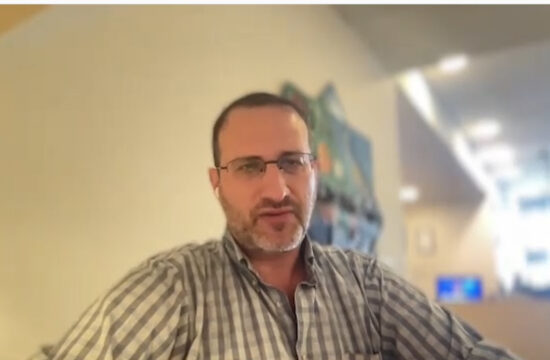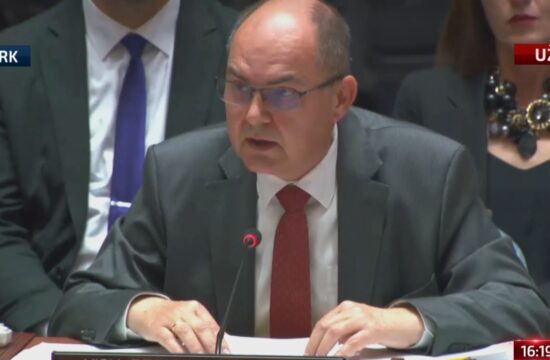We are already feeling climate change. Europe will not be hungry, but we will pay more for food. We will have to compromise on water use and energy security. We are facing great challenges all over the world, and we still have room for salvation, but we must act immediately, just some of the messages of Prof. Ph.D. Maarten van Aalst, director of the Climate Center of the International Committee of the Red Cross and professor at the University of Twente in an interview with N1.
N1: I said, in my opening that you are the director of the ICRC climate center, which is unusual because when we think about ICRC, we don't think about climate change. But as we are seeing in the last several week's situations with climate change is endangering lives and making lives even worse than we expected. The situation, for example, in the UK as I spoke with the other experts, was supposed to be like this in 50 years, a hundred years, but it's happening in 2022. So what we are seeing at this moment, when it comes to climate change and how this is endangering us, or how is this changing our lives rapidly at this moment?
PROF. VAN AALST: I think you're spot on. 20 years ago, many people were asking us, why is the red cross engaged in climate change. Because climate change was seen as an environmental
the problem for the far future and the iconic image was the polar bear on a melting ice shelf on the north pole in 2100. And the question was do we know that that humans are causing the warming that might lead to those environmental problems? And, what would we need to do to reduce emissions to prevent that from happening? But it was all quite abstract and long-term. In the last 20 years, reality has caught up with us. We know that climate change is already happening. It is due to the increase in greenhouse gases, primarily due to the burning of fossil fuels. And we have to work on it on all fronts, reduce the emissions to avoid the warming from continuing further, adapt to deal with what is maybe a changing climate that we already live in today, but even also cope with the extremes that are already affecting us today. And indeed, sadly, also even killing people. So that is the work of our volunteers at the front lines of these rising risks, all around the world, every day.
N1: Now, what we are seeing at this moment is that some scientists are saying that that goal of keeping global warmth under 1.5 degrees is almost lost, that we will face ourselves with 2 degrees or maybe even 3 degrees, If we don't stop what we are doing at this moment. And these temperatures, which we are seeing at the moment, for example, in Great Britain or in Spain, are basically telling us that the trends are not going in our favor. What is your assessment, of where we are standing when it comes to 1.5 degrees centigrade?
PROF. VAN AALST: Well, I think there are two important elements there. 1.5 degrees is potentially still possible, but we need a major course correction really rapidly. So a much quicker, active climate policy than we have seen in the past years. We have seen progress since the Paris agreement was signed, for instance, in 2015. So we're moving in the right direction, but we're not moving in the right direction fast enough. At the same time, what we've seen since the Paris agreement was signed is that the risks we're already seeing today are higher than we anticipated. And the science is also showing us that even at 1.5 degrees, the risks are higher than we had anticipated before. Relatively smaller temperature rise, for instance, 1.5 degrees is already very dangerous. So it's getting clearer and clearer that we really need to do everything we can to keep that warming, while at the same time already adapting to what is facing us today. And we're seeing that around us in Europe at the moment.
N1: Professor, you're also part of IPCC working group two, which is basically one of the groups which is working on assessments, where we are standing at this moment. What are the major risks for us at the moment when it comes to climate change? Because last IPCC report or report before that, have said that we should expect to see more extreme waves of heat in areas where we didn't expect that, but also in the areas where we didn't expect to see more extreme, lower temperatures and freezes and cold temperatures to happen. What are the risks at the moment?
PROF. VAN AALST: So the UN secretary-general Antonio Guterres called the IPCC working group report Atlas of human suffering. So there are many risks and many types of impacts around the world, many of which we're already seeing happening today. So that's one important message that is no longer a projection for the future only. It's also what we are already observing and is directly connected to anthropogenic climate change. It is many types of extremes. The one that is increasing most universally, almost everywhere on earth is heat waves. And that's one of the risks that I think we have underestimated as a major risk driver. So people have always been thinking about sea level rise and then the risk of coastal flooding or increases in heavy rainfall and
therefore the risk of riverine flooding like we saw last year, for instance, also in Germany and Belgium, killing hundreds of people in the heart of Europe, or indeed the increasing temperatures then driving and also longer periods of no rainfall, driving increased risk of drought, which we're also seeing in many parts of Europe right now. The direct impact of heat has not been appreciated so much. So the areas that were already hot once in a while in summer, didn't appreciate how much harder it would get with the increase in the intensity of heat waves. That's very much the case around the Mediterranean at the moment where temperatures are getting somewhat unbearable, but also many countries that were thinking of themselves as not at risk of heat waves. You mentioned the United Kingdom, for instance. It was a country that thought once we finally get a couple of warm days, that's actually a nice day, that's a good summer day that allows people to go to the beach. We completely underestimate the excess mortality among vulnerable people in society that would go along with those heat extremes that people are not accustomed to, and therefore not adapted to. So people are not adjusting their behavior to the new risks that are appearing. An important message there is also that quite a lot of those impacts are avoidable. So particularly for heat waves that the human health impacts can be managed, if we invest in the short term, our behavior during those heat waves, good heat waves, early warning systems, but then also, for instance, ensuring that vulnerable people drink enough during those very hot periods. So that's also me looking after my elderly people in my own neighborhood, for instance, and for the longer term, for instance, adapting how we build our cities, greener cities, or cooler city. So those are choices we're making now about the way our villages and our cities will be shaped for the coming decades, where we need to think about that hotter climate that we will be facing.





Kakvo je tvoje mišljenje o ovome?
Budi prvi koji će ostaviti komentar!